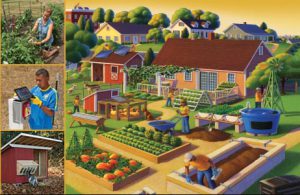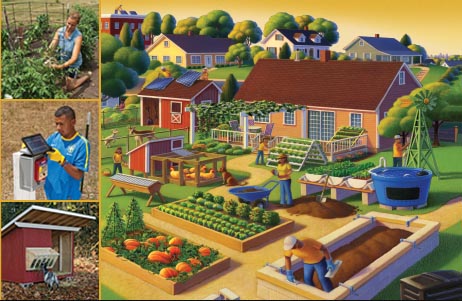Introduction
For nearly a decade I have been following the bad news on climate change and peak oil and become increasingly concerned by them. In recent years I have started to both reduce my personal carbon footprint and actively prepare for what looks like an uncertain and troubling future for us all. I have now decided to write about these issues and my responses to them in this blog.
I don’t claim to be special, just an office worker deciding to eschew fossil fuels and embrace a lower carbon and more self-reliant lifestyle. I make no claim about being a pioneer in this field as it has been happening since at least the 1970s.
However, I think it is going to be an increasing trend as more and more people come to see that the existing system is broken and unhealthy, for us and our environment, and that it is in visible decline. Therefore my experiences of going through this process, both the successes and the failures, may be of interest to a growing number of people.
Colonial Imports
I can only write about my own experiences, of course, but I think that can be valuable. I will be attempting a ‘homesteading’ lifestyle in the UK and that is still fairly unusual. By homesteading I mean adapting a property to produce more than it consumes, in terms of energy, food, water, and so on. The US has a long tradition of homesteading and I think it has a lot to teach us on this side of the pond about self-reliance and self-sufficiency.

A Traditional US Homestead – From the Cover of 40 Homestead Projects book (Image: Amazon.com)
The closest idea we have over here is the smallholding, but that tends to imply something bigger than a family unit and run with a view to make public sales. Alternatively we have the allotment that is separate physically from the home and can only contribute food, not energy, water or other needs. Instead homesteading is all about sustaining a family in all ways with what can be produced on its own property.
The particular approach I will be following is Permaculture – an idea imported from Australia this time – that provides a structure for how to develop a homestead. It covers food production, energy production, water management and so on, with the aim of making all these elements sustainable within the property (i.e. not needing external inputs like fertilisers). I will be learning more about Permaculture as I progress, but from what I’ve already learned I believe it is so powerful that it has the potential to solve many of these problems from the level of the homestead right up to the functioning of nation states.
Topics
I will initially describe how I came to follow this path, then cover my first actions and long-term plans. Early subjects will include food production, solar power and batteries (naturally), electric vehicles, and selecting the best land for a homestead. Later I hope to cover a greater range of subjects including fruit growing, water storage, food storage, cooking, wind turbines and waste management. In parallel I will also cover related news and developments in the economy and environment.
Although the general outlook ahead for our climate and society can be disheartening, we are for sure living in the most exciting period in human history. The opportunities currently available make it a perfect time to become more self-reliant and even self-sufficient, particularly with the aid of technology (such as my house being able to run off-grid when I choose). It is a time of contradictions, when we can decide we want to learn how to make or do things in the old-fashioned ways to lower our footprint, then have a book on the subject delivered to us by diesel truck in less than 24 hours.
It has been said that the next 20 years will see more change than the last 100. I think there is truth in that, and I hope you’ll join me on my journey to self-reliance. You might learn something useful, even if it’s only how not to do something!
Trevor Larkum, January 2020




